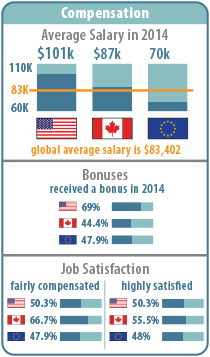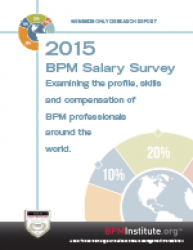A must read for business analysts, business process analysts, business process managers, business process designers and business architects.
This BPM Salary Survey report outlines a regional comparison across the USA, Canada and EMEA (Europe, Middle East and Africa). It is based upon the data collected in the BPM 2015 Salary Survey conducted by BPMInstitute.org which represented the first such survey and formed the baseline for our future research in this area.
The objective of the 2015 survey was to examine the profile, skills, and compensation of BPM professionals around the world based on an international sample of 352 respondents and examined factors such as age, gender, education, job satisfaction, salary and bonus, certification, background, and other characteristics. This report now compares factors such as respondent demographics, company characteristics, job status, and compensation based on the responses from 155 USA respondents, 36 respondents from Canada and 48 respondents from EMEA.
Respondent characteristics include factors such as age, education and sex. Company size, industry affiliation and BPM maturity are included in company characteristics. In the areas of job status and compensation, factors such as position, job role, and job function are reviewed as well as average compensation and bonus considerations.
 Demographics
Demographics
There were some major differences observed in terms of age, education and sex. While 42.6% of respondents were women in the USA, and women accounted for 38.9% of respondents in Canada, it was noteworthy that women represented only 18.8% of total respondents in EMEA.
When it comes to age, the respondents in EMEA were much younger – 35.4% of EMEA respondents were under 35 years of age. In comparison, on a percentage basis only about half as many respondents or 17.4% of US respondents and 16.7% of Canadian respondents were under the age of 35.
With respect to education, the group from EMEA reported higher levels of education with 75.1% of respondents in EMEA holding an advanced degree (Masters or PhD) in comparison to 45.1% of respondents in the US and only 16.7% in Canada.
In summary, the group of respondents from EMEA was younger and better educated and more likely to be men than their counterparts in the USA and Canada.
Company Characteristics As might be expected, the highest representation from large companies was in the USA, where 43.3% of respondents worked in companies with annual revenues greater than 1 billion dollars as compared to 36.2% of respondents in Canada working in organizations of similar size and only 21.1% of respondents in EMEA.
As might be expected, the highest representation from large companies was in the USA, where 43.3% of respondents worked in companies with annual revenues greater than 1 billion dollars as compared to 36.2% of respondents in Canada working in organizations of similar size and only 21.1% of respondents in EMEA.
In terms of industry representation, more than 50% of the respondents in the USA were from banking, government, insurance and technology, yet this trend was not as clear in EMEA and Canada. In EMEA, more than 30% of respondents came from the technology sector, representing software vendors, technology manufactures and service providers. In terms of BPM maturity, nearly 18% of respondents in the USA and Canada indicated that they worked for firms that were at the higher end of the maturity scale, compared to only 5.6% of respondents in EMEA.
Job Status
When asked what title best describes their position, 59.4% of US respondents were either BPM Practitioners or BPM Team Leaders. The comparable statistic for EMEA was 41.7%, while 43.8% of respondents in EMEA selected “Consultant” as the title that best described their position, as compared to 33% in Canada and only 15.5% in the USA. The highest percent of full time employees were in the USA, where 92.3% were in a full time salaried position, as compared to 83.3% in Canada and 75% in EMEA. Conversely, 20.8% of EMEA respondents were engaged as independent consultants as compared to 6.5% in the USA and 13.9% in Canada. Half of the total number of respondents from EMEA reported that their work was fully dedicated to BPM, while the comparable statistic in the USA was 38.7% and 36.1% in Canada. When asked what term best describes their role, the titles business analyst, business process analyst, business process manager and business process designer were frequently cited. Those four titles were selected by 69% of respondents in the US, 64.5% in EMEA and 69.4% in Canada. The title of business architect was the next most frequently cited. The moist frequently mentioned functions, regardless of role, were consistently process modeling, process analysis, process design, process implementation and process governance. Nearly 50% of US respondents had been employed with their current company for 7 or more years, as compared to 41.1% in EMEA and only 27.7% in Canada.
 Compensation
Compensation
Compensation varied quite widely across the three regions. In 2014, the average base salary for the 155 respondents in the USA was $101,693.50 as compared to $87,083.33 for the 36 respondents in Canada and $70,000.00 for the 48 respondents in EMEA. Further, 69% of US respondents reported that they had received a bonus during the prior year while only 47.9% of EMEA respondents and 44.4% of Canadian respondents reported having received a bonus in 2014. The results for average base salary and bonus were significantly influenced by the fact that 12 respondents in the USA or 7.8% of the total reported that they earned in excess of $150,000.00 in base salary. In response to the question, “Do you feel that you are fairly compensated?” – 66.7% of Canadian respondents felt that they were fairly compensated as compared with 50.3% of US respondents and 47.9% of respondents in EMEA. Similarly, 55.5% of Canadian respondents were either highly or very highly satisfied in their current position as compared to 50.3% in the US and 48% in EMEA.
BPM Credentials
The survey results indicate that BPM professionals are increasingly recognizing the value of obtaining a certificate and professional certification. More than 30% of the respondents indicated that they had earned a certificate or certification. Download the full report for details.
Download the full report:

















